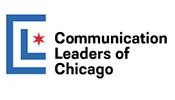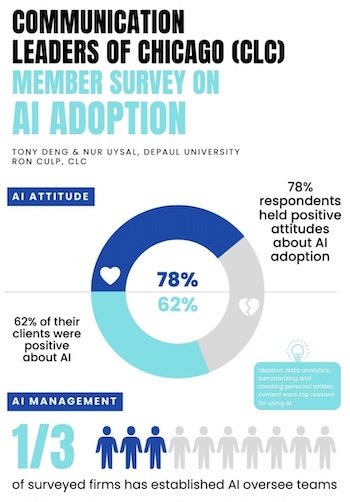 |
The Windy City is bullish on AI, according to a recent survey conducted by the Communications Leaders of Chicago in conjunction with DePaul University’s College of Communication.
The AI-Human Communication Research Project asked more than 80 comms leaders in the Chicago area for their opinions about the issues surrounding artificial intelligence and the purposes to which it is being put.
More than three-quarters (78 percent) of the survey respondents held “slightly to extremely positive attitudes” about AI adoption. They also said that a majority (62 percent) of their clients (including internal corporate clients) had a favorable view of AI.
But when it comes to keeping an eye on how AI is used, companies are lagging behind, with only 33 percent of respondents saying their firms have a team or department with responsibility for managing and overseeing the implementation of AI. The most common strategies for monitoring AI are AI compliance groups, governance committees, and AI task forces and communication labs.
 |
More than four out of 10 said that their organizations have an AI policy or code of conduct.
The top use of AI amongst survey participants was for producing creative content (43 percent), with research and data analytics taking second place (30 percent). Administrative (18 percent) and social media management (16 percent) were also relatively popular uses.
Half of the survey respondents said that AI work product is allowed at their companies, “on a limited-use basis,” with 20 percent saying that it was considered OK for “any use.”
The list of top priorities for AI in the coming year was led by data-driven strategies, authenticated AI-generated content and AI workflow management, with AI-derived business intelligence and building AI-enabled teams also considered as important.
The top three things to look out for when adopting AI for strategic communications were considered to be AI output/accuracy, ethical issues and privacy/data security.
The results of the study were discussed at a Communications Leaders of Chicago event at DePaul’s downtown Chicago campus.
“It’s clear that more firms need to impose AI operating policies and guidelines as AI-enabled work expands,” said Jack Modzelewski, co-chair of the CLC board. “And as an industry we need to be a leader in AI best practices and applications.”


 Thanks to advances in AI, social media has now taken a leading role in providing customer support services for brands, with adoption achieving noted fanfare among Gen Z consumers.
Thanks to advances in AI, social media has now taken a leading role in providing customer support services for brands, with adoption achieving noted fanfare among Gen Z consumers. Why universities must offer Communications Engineering degrees in the AI-driven world.
Why universities must offer Communications Engineering degrees in the AI-driven world. The emergence of generative artificial intelligence (Gen AI) technology is a curveball that has the potential to significantly disrupt and erode voter trust in the media and governmental leadership.
The emergence of generative artificial intelligence (Gen AI) technology is a curveball that has the potential to significantly disrupt and erode voter trust in the media and governmental leadership. The process of conducting searches is being transformed by generative AI, which is now embedded within search engines such as Bing, Perplexity, and Google's Search Generative Experience.
The process of conducting searches is being transformed by generative AI, which is now embedded within search engines such as Bing, Perplexity, and Google's Search Generative Experience. The AI revolution in retail is just starting in 2024. This technology is evolving rapidly, and those who embrace it will thrive in the coming years.
The AI revolution in retail is just starting in 2024. This technology is evolving rapidly, and those who embrace it will thrive in the coming years.


 Have a comment? Send it to
Have a comment? Send it to 
No comments have been submitted for this story yet.